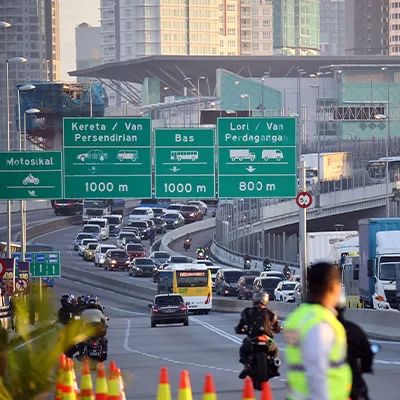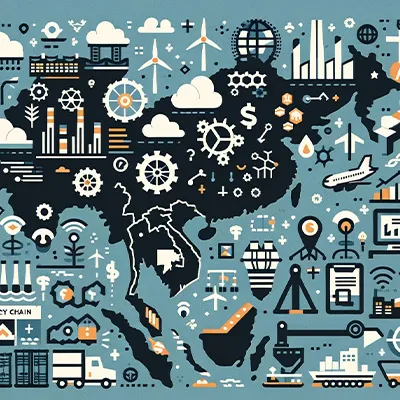When Singapore-based precision engineering company Sunningdale Tech decided to expand into Indonesia in 2013, it had several aims in mind.
These ranged from wanting to meet the needs of Indonesian clients to expanding its supply chain and also tapping on the complementary advantages of both Singapore and Indonesia’s island of Batam. Batam, and its neighbouring island Bintan, are only about 20km and a 45-minute sea journey away from Singapore. Both islands are important free-trade zones (FTZs) for the Indonesian government to attract investors.
For manufacturers using Singapore as their regional headquarters, Batam and Bintan in Indonesia’s Riau Islands province, are convenient points of entry into the Indonesian market. They are also key locations for manufacturers that have adopted the “SG+” twinning strategy, that allows businesses to tap into the complementary advantages of neighbouring countries in Southeast Asia.
Sunningdale’s factory in Batam spans 15,000 sq. m and employs about 450 Indonesians.
Given the size of Sunningdale’s workforce in Batam, the factory focuses on production while product design, along with key processes such as final assembly and testing of products, is done at the Singapore headquarters. These processes play to Singapore’s strengths as they involve high-tech and automated manufacturing.
Due to the close proximity of the company’s Indonesia factory to the R&D testing site in Singapore, Sunningdale Tech is able to gather feedback quickly and effectively.
In addition to its headquarters in Singapore, Sunningdale Tech also has business dealings in Malaysia, Thailand, China, India, Europe and Mexico. By tapping on Singapore’s strong logistic networks, Sunningdale Tech is able to distribute its products, spare parts, and components produced in Batam to international markets through third-party logistics support. This wider reach allows the company to tap into more opportunities and markets around the world.
The facility that Sunningdale is in was built by Gallant Venture, a commercial and integrated industrial park developer that operates two industrial zones: Batamindo Industrial Park and Bintan Industrial Estate in Batam and Bintan, covering 320 ha and 4,000 ha respectively. They were jointly developed by financial institutions from Singapore and Indonesia with the full backing of both governments.
Construction of the smaller Batamindo Industrial Park began in 1990, and many multinational corporations (MNCs) such as Phillips, Epson, and Sumitomo Corp shifted their labour-intensive operations there from Singapore to adopt the “SG+” strategy and facilitate a twinning model, disclosed Gallant Venture’s Head of Riau Investments, Mr Edmund Lai.
The larger Bintan Industrial Estate began construction in 1994 and only about 10 per cent of the full area is currently being used. The industrial estate takes full advantage of its proximity to the sea, with the Bintan Offshore Maritime Centre located on its grounds. An international airport is also being built nearby and is expected to be completed by 2025.
Currently, 82 foreign manufacturers employing a total of 55,000 people have set up operations in Bintan Industrial Estate and Batamindo Industrial Park, said Mr Lai. One-third of the companies hail from Japan. Others are from places such as Singapore, Indonesia, the United States, Germany, Australia, France, South Korea, and Taiwan. One-third of the manufacturers are in the electronics industry, while others are in fields such as precision engineering and plastic injection moulding.
Mr Lai noted that companies from the US, Europe and China have chosen to expand their presence in Indonesia. To these manufacturers, Southeast Asia not only provides an ideal environment for the manufacturing industry to grow —it can also increase the resilience of their supply chains and reduce their dependence on a single manufacturing base.
Synergy Between Singapore and Malaysia’s industrial parks
Gallant Venture is one of three strategic partners of the Southeast Asia Manufacturing Alliance, along with Sembcorp Development (a Sembcorp Industries subsidiary) and CapitaLand. Together with EDB and Enterprise Singapore, the partners have developed a network of industrial parks for manufacturers who are interested to invest in both Singapore and the region.
The three companies have over 10 industrial parks in Malaysia, Indonesia and Vietnam altogether.
Nusajaya Tech Park is one of the parks run by CapitaLand.
“We hope to tap on Singapore and Malaysia to create a next-generation tech park that will benefit both local and international companies.” said CapitaLand’s Chief Customer Solutions Officer Aylwin Tan.
So far, 36 MNCs from Singapore, Malaysia, China, South Korea, the United States, the United Kingdom and Germany have established themselves in Nusajaya Tech Park. They are mainly advanced manufacturers from industries such as aerospace, electronics, foodstuffs, medical equipment, precision engineering and data centres. The companies have pledged to invest a total of approximately S$500 million (RM1.7 billion) in Nusajaya Tech Park.
Some industries have high floor loading requirements and need high ceilings to accommodate large machines, Mr Tan added. Nusajaya Tech Park is able to meet those needs as Malaysia has enough land for single-storey factories.
With a total area spanning over 150 ha, Nusajaya Tech Park is able to provide 9 million sq ft of commercial space for up to 200 enterprises.
This article was adapted from a content series produced by Singapore Chinese-language media organisation Lianhe Zaobao, that spotlights how businesses can tap on opportunities across Southeast Asia and serve global markets, from Singapore.
Read the other pieces in the series on supply chain diversification, the thriving biopharma industry, and how South Korea’s Paris Baguette is expanding in Southeast Asia.







